2013春人教版英语七下《Unit2 Whattime do you go to school Section B》ppt课件
人教版七下 Unit 2 What time do you go to school?知识点总结

Unit 2 What time do you go to school?必背短语get up 起床 get home到达家中 get to work到达工作岗位 make breakfast做早饭make a shower schedule做一个洗澡的安排 practice guitar 练吉它 leave home 离家take a shower = have a shower 洗淋浴澡 take the Number 17 bus to the Hotel 乘17路公共汽车去旅馆go to class 上课 go to school 上学 go to work 上班(反义词 go home)have breakfast/dinner/lunch吃早晚午饭put on 穿衣服(反义词take off) do one’s homework 做家庭作业tell sb. about sth. 告诉某人某事 tell sb. to do sth. / tell sb. sth.know about sth. 知道某方面的情况 love to do/doing = like to do/doing 喜欢干某事listen to the early morning news on radio 听电台早间新闻 listen to 听…watch the early morning news on TV 看电视早间新闻around six o’clock 六点左右 in the morning 在早上 in the afternoon 在下午 in the evening 在晚上考点解析※get up 起床 eat breakfast=have breakfast 早餐(三餐前省略冠词)have三餐吃…..※job与 work job与 work 都是指工作,但job是可数名词,work是不可数名词. a job 一份工作 work 可以做动词讲,但是job不可以※Life 生活 lives (复数) health健康 healthy健康的 healthily健康地unhealthy 不健康的 keep health 保持健康 healthy food 健康食品have a healthy life =live a healthy life 过着健康的生活※3个穿的区别:wear 表状态,接服装、手套、眼镜、香水等 put on 表动作,接服装dress 表动作,接sb/ oneself get dressed穿衣语法精讲1,问时间what time或者when what time询问具体时间(几点几分) when:时间、日期、年份、月份等提问2,take a shower=have a shower 沐浴3,at a radio station 在广播电台 from……to ……从……到…..(连接两个时间或地点)4,be/ arrive late for :迟到 be late for school5,exercise 锻炼,练习(动、不可数名词) do/take exercise 做锻炼(运动)6,频度副词(实意动词前;be动词后)Always usually often sometimes seldom hardly never★下面的排列更直观地说明了这几个词的频率的"大小"。
人教版七年级下册英语《Unit2Whattimedoyougotoschool》词句精讲精练
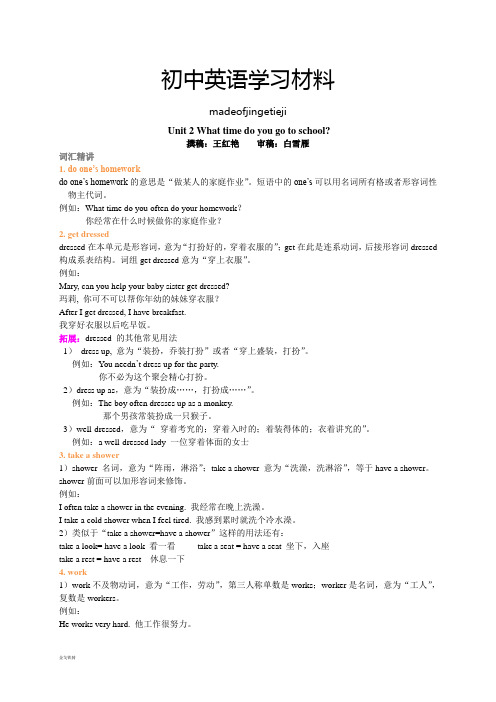
初中英语学习材料madeofjingetiejiUnit 2 What time do you go to school?撰稿:王红艳审稿:白雪雁词汇精讲1. do one’s homeworkdo one’s homework的意思是“做某人的家庭作业”。
短语中的one’s可以用名词所有格或者形容词性物主代词。
例如:What time do you often do your homework?你经常在什么时候做你的家庭作业?2. get dresseddressed在本单元是形容词,意为“打扮好的,穿着衣服的”;get在此是连系动词,后接形容词dressed 构成系表结构。
词组get dressed意为“穿上衣服”。
例如:Mary, can you help your baby sister get dressed?玛莉, 你可不可以帮你年幼的妹妹穿衣服?After I get dressed, I have breakfast.我穿好衣服以后吃早饭。
拓展:dressed 的其他常见用法1)dress up, 意为“装扮,乔装打扮”或者“穿上盛装,打扮”。
例如:You needn’t dress up for the party.你不必为这个聚会精心打扮。
2)dress up as,意为“装扮成……,打扮成……”。
例如:The boy often dresses up as a monkey.那个男孩常装扮成一只猴子。
3)well-dressed,意为“穿着考究的;穿着入时的;着装得体的;衣着讲究的”。
例如:a well-dressed lady 一位穿着体面的女士3. take a shower1)shower 名词,意为“阵雨,淋浴”;take a shower 意为“洗澡,洗淋浴”,等于have a shower。
shower前面可以加形容词来修饰。
例如:I often take a shower in the evening. 我经常在晚上洗澡。
初中英语人教版七年级下Unit 2 What time do you go to school知识点
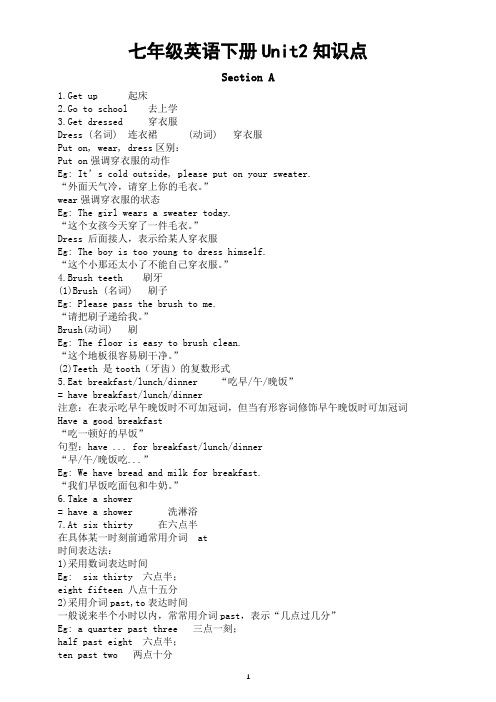
七年级英语下册Unit2知识点Section A1.Get up 起床2.Go to school 去上学3.Get dressed 穿衣服Dress (名词) 连衣裙 (动词) 穿衣服Put on, wear, dress区别:Put on强调穿衣服的动作Eg: It’s cold outside, please put on your sweater.“外面天气冷,请穿上你的毛衣。
”wear强调穿衣服的状态Eg: The girl wears a sweater today.“这个女孩今天穿了一件毛衣。
”Dress 后面接人,表示给某人穿衣服Eg: The boy is too young to dress himself.“这个小那还太小了不能自己穿衣服。
”4.Brush teeth 刷牙(1)Brush (名词) 刷子Eg: Please pass the brush to me.“请把刷子递给我。
”Brush(动词) 刷Eg: The floor is easy to brush clean.“这个地板很容易刷干净。
”(2)Teeth 是tooth(牙齿)的复数形式5.Eat breakfast/lunch/dinner “吃早/午/晚饭”= have breakfast/lunch/dinner注意:在表示吃早午晚饭时不可加冠词,但当有形容词修饰早午晚饭时可加冠词Have a good breakfast“吃一顿好的早饭”句型:have ... for breakfast/lunch/dinner“早/午/晚饭吃...”Eg: We have bread and milk for breakfast.“我们早饭吃面包和牛奶。
”6.Take a shower= have a shower 洗淋浴7.At six thirty 在六点半在具体某一时刻前通常用介词 at时间表达法:1)采用数词表达时间Eg: six thirty 六点半;eight fifteen 八点十五分2)采用介词past,to表达时间一般说来半个小时以内,常常用介词past,表示“几点过几分”Eg: a quarter past three 三点一刻;half past eight 六点半;ten past two 两点十分半小时过后多用介词to,表示“差几分到几点”Eg: a quarter to three 两点四十五;twenty to four 三点四十3)a. m. 和p. m.A.m. 表示“午前;上午”(午夜12:00后至中午12:00前);p.m. 表示“午后;下午”(中午12:00后至午夜12:00前)。
人教版七年级下册英语:Unit 2 What time do you go to school知识点讲解及练习题目及答案
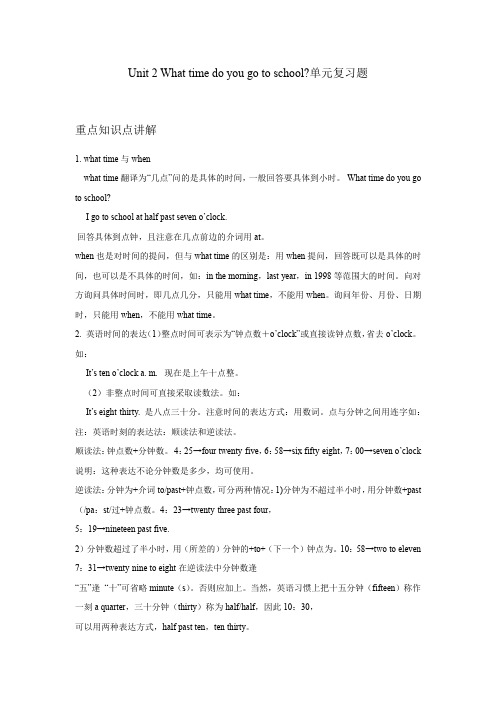
Unit 2 What time do you go to school?单元复习题重点知识点讲解1. what time与whenwhat time翻译为“几点”问的是具体的时间,一般回答要具体到小时。
What time do you go to school?I go to school at half past seven o’clock.回答具体到点钟,且注意在几点前边的介词用at。
when也是对时间的提问,但与what time的区别是:用when提问,回答既可以是具体的时间,也可以是不具体的时间,如:in the morning,last year,in 1998等范围大的时间。
向对方询问具体时间时,即几点几分,只能用what time,不能用when。
询问年份、月份、日期时,只能用when,不能用what time。
2. 英语时间的表达(1)整点时间可表示为“钟点数+o’clock”或直接读钟点数,省去o’clock。
如:It’s ten o’clock a. m.现在是上午十点整。
(2)非整点时间可直接采取读数法。
如:It’s eight-thirty. 是八点三十分。
注意时间的表达方式:用数词。
点与分钟之间用连字如:注:英语时刻的表达法:顺读法和逆读法。
顺读法:钟点数+分钟数。
4:25→four twenty-five,6:58→six fifty-eight,7:00→seven o’clock 说明:这种表达不论分钟数是多少,均可使用。
逆读法:分钟为+介词to/past+钟点数,可分两种情况:1)分钟为不超过半小时,用分钟数+past (/pa:st/过+钟点数。
4:23→t wenty-three past four,5:19→nineteen past five.2)分钟数超过了半小时,用(所差的)分钟的+to+(下一个)钟点为。
10:58→two to eleven 7:31→twenty-nine to eight在逆读法中分钟数逢“五”逢“十”可省略minute(s)。
人教版七年级英语下册《Unit 2 What time do you go to school》教案

《Unit 2 What time do you go to school》教案Teaching objectives knowledgeThetarget1. Learn and master the following words:up get up dress g et dressed brush toothshower take a shower usually forty wownever early fifty job work station radiostation o’clock night funny exercise2. To learn to ask and talk about the spokenlanguage of the time, make the schedule:-What time do you usually take a shower?-I usually take a shower at six forty.-What time do you usually get up?-I usually get up at eight thirty at night.AbilitytoThetarget1) learning with credit to special questions abouttime and time.2) with the knowledge of the target language t o lifeand learning activities to make plans, to reasonablyarrange work and rest time.emotionalTheSection A, talk about the topic is "routine" time,the learning content close to student's life, becausethe students' work and rest time arrangement is verytarget regular. By asking each other or talk about yourself or a loved one's work and rest time arrangementand activity plan, and punctuality can cultivatestudents' good habit, the habit.Teaching important points Learn to ask and talk about time and make the schedule.Teaching difficultpoints Credit to guide the expression of special questionsand time.The teachingmethodTask-based teaching method and teaching.。
英语七年级下册语法Unit2What-time-do-you-go-to-school

Unit 2 What time do you go to school ? 一.What time 什么时候,几点钟。
常用于对具体的(确切的)时间提问,也可用when来替换,但反之不一定行。
1. What time/ When do you get up in the morning?I get up at six o’clock in the morning.2. What time is it ? / What’s the time ?It’s six-thirty. / It’s half past six.二.★关于时间的表达法:顺读法,逆读法。
1. 顺读法:按汉语的习惯,先说点后说分的方法。
结构:点+分。
5:10 five-ten 8:30 eight-thirty9:46 nine forty-six 1:05 one-five整点的读法:基数词+o’clock7:00 seven o’clock 12:00 twelve o’clock2. 逆读法:借助介词past或to, 先说分后说点的方法,其结构为:分+past/to +点past 过to 差①当分钟数小于或等于30分钟时,用介词past表示。
7:05 five past seven 6:30 thirty past six =half past six30 thirty=half an hour 11:25②当分钟数大于30时,用介词to表示:几点差几分。
其结构为:(60-分)+to +(点+1)11:50 ten to twelve 9:45 fifteen to ten =a quarter to ten7:55 3:35hour 小时minute 分second 秒quarter 一刻钟写出同义句:seven thirty = ____ ____ seven eight forty = ____ ______ nine 三.★感叹句What a funny time to eat breakfast !What a lucky guy!定义:表示喜怒哀乐等强烈感情的句子叫感叹句。
七年级英语下册Unit2Whattimedoyougotoschool短语语法知识点汇总人教版
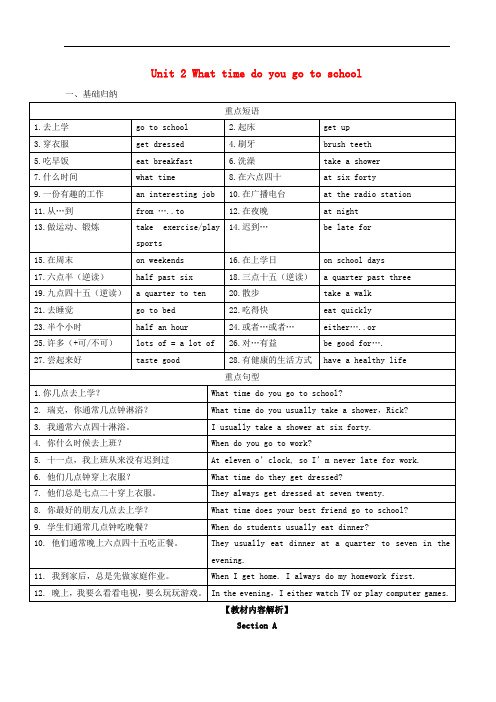
Unit 2 What time do you go to school 一、基础归纳【教材内容解析】Section A1.get dressed (P. 7)get dressed意为“穿上衣服”,dress用作动词,表示“给(某人)穿衣服”,接宾语时,只能接表示人的名词或者代词。
He can’t dress himself.I usually dress my daughter before I go to work.【拓展】辨析wear, put on和dress2.take a shower (P. 7)take a shower意为“洗淋浴”,相当于have a shower,shower用作名词,表示“淋浴”。
I often take a shower in the evening.I take a cold shower when I feel tired.3.What time do you usually get up, Rick? (P. 7)(1)what time用来询问具体的时间点,表示“什么时候”。
What time do you go to school?(2)usually是频度副词,意为“通常、一般”,在句中作状语,一般位于实义动词之前,连系动词be、助动词或者情态动词之后。
I usually have lunch at school.He usually goes to school by bike.4.I never get up so early. (P. 8)early此处用作副词,表示“很早地”,反义词为late,意为“晚地”。
Please come to school early tomorrow.【拓展】early还可以用作形容词,表示“早的、提前的”,反义词是late,意为“晚的”。
He gets up early to catch the early bus.5.Scott has an interesting job. (P. 8)job用作可数名词,表示“工作”,强调具体的职业或者工作,work表示“工作”时,用作不可数名词,指人们日常生活和工作中从事的体力或者脑力劳动,及各类工作。
七年级下册unit2-What-time-do-you-go-to-school-知识点讲解与练习

1.What time do you get up?释:这是一个由疑问词what time(几点)引导的特殊问句。
其结构:What time +助动词do/does +主语+动词原形,询问某人做某事的具体时间。
例如:what time do you begin class in the morning?你们早晨几点开课?注:What’s the time=What time is it?也是用来询问时间,意为“几点了”。
用it作答。
例如:What’s the time? It’s 7:30.几点了?七点半了。
2.I usually get up at five o’clock. 我通常在五点钟起床。
释:1)句中usually与often 一样都是频度副词,常用于动词be 之后,行为动词之前。
always意思是“总是”、“永远”,表示动作重复,状态继续,中间没有间断,通常用来修饰动词的一般时态。
例如:We always get up before six o'clock.我们总是六点前起床。
若修饰动词进行时,则有“老是”,“再三地”的意思,带有厌烦、不满、赞美等感情色彩。
例如:You are always coming late.你老是迟到。
(含有责备的意思)He is always thinking of others.他总是想着别人。
usually(75%)意为“通常”,着重表示已习惯的动作。
反义词为:unusually。
例如:They usually have four classes in the morning.他们上午通常上四节课。
They usually do some shopping on Sunday.他们通常星期天买东西。
often(50%)意为“时常”、“经常”,表示常常这样,但不总是这样,反义词为:seldom。
例如:She often helps her mother with her housework after school.放学后她常常帮助母亲做家务。
2013学年七年级下册 Unit 2 What time do you go to school(Section A 1a-2c)课件 人教新目标版

Proverbs: Time is money. 一寸光阴,一寸金。 Time is life. 时间就是生命。 Time flies. 时光如梭 Time and tide wait for no man. 时不我待!
What time is it? It’s …
对划线部分提问:
He eats breakfast at seven o’clock. What time does he eat breakfast?
She plays sports at eight o’clock.
What time does she play sports?
He eats breakfast at seven o’clock.
1.I get up at six thirty. (提问) What time do you get up? 2.She eats breakfast at a quarter past seven. What time does she eat breakfast? 3.Jerry goes to school at seven fifteen. What time does Jerry go to schol? 4.Mary takes a shower at 8:00. (一般疑问句) Does Mary take a shower at 8:00? 5.My father goes to work at half past eight.(同上)
2. always 意为“总是,一直”
usually 意为“通常地,” never 意为“从未,绝不”
频率词
(用在实义动词前, 助动词/be动词后.)
often 意为“ 经常 ”
人教版七年级英语下复习Unit2 What time do you go to schoo

(2013·山东潍坊)When did the terrible earthquake happen in Sichuan? It happened_____8:02____the morning of April 20th,2013.
A.on;in B.at;on C.at;in D.on;on
go home 回家 letter n.信
around adv.大约
start v.开始;出发 write v.书写;写
tell v.告诉;讲述 me pron.我(I的宾格)
soon adv.不久
wish n.希望;祝愿
best (good,well最高级)最好的(地)
Saturday n.星期六 am (a.m.)上午 survey n.调查;考察
o’clock adv.(只用于正点)......点钟 work v.&n. 工作
hour n.小时 brush v.刷
teeth n.(tooth复数)牙齿
after 在......之后 go to work 去上班
get to 到达
bus n.公共汽车 hotel n.旅馆
all prep.全部;全体
in May in summer in 2011
介词on用在日期、星期几、节日前,也可表示具体
某一天的早上、下午、晚上等。
usually 频率副词 usually: 频度副词,意为“通常”。
在句中作状语,一般位于实义动词之前, 系动词、助动词或情态动词之后。
Eg: I usually have lunch at school.
逆读法: 借助介词past或to 。 小于等于30分钟:分钟+past+小时 几点过几分
人教版七年级英语下册Unit 2 What time do you go to school知识点归纳总结

Unit 2 What time do you go to school?◆短语归纳1. what time 几点2. go to school 去上学3. get up 起床 go to bed 上床睡觉(反义词get up )4. take a shower = have a shower 洗淋浴5. brush teeth 刷牙6. get to 到达7. do homework 做家庭作业 8. go to work 去上班(反义词 go home )9. go home 回家 10. eat breakfast 吃早饭 11. get dressed 穿上衣服12. get home 到家13. either…or… 要么…要么… 14. make breakfast 做早饭15. in the morning/ afternoon/ evening 在上午/下午/晚上 16. take a walk 散步17. lots of=a lot of 许多,大量 18. radio station 广播电台 19. at night 在晚上20. be late for=arrive late for 迟到21.make a shower schedule 做一个洗澡的安排22. have breakfast/dinner/lunch 吃早晚午饭 23.get to work 到达工作岗位24.practice guitar 练吉它25.leave home 离家26.go to class 上课27.take the Number 17 bus to the Hotel 乘17路公共汽车去旅馆◆用法集萃 ◆典句必背 1. What time do you usually get up? I usually get up at six thirty. 2. That’s a funny time for breakfast. 3. When do students usually eat dinner? They usually eat dinner at a quarter to seven in the evening.4. In the evening, I either watch TV or play computer games.5. At twelve, she eats lots of fruit and vegetables for lunch..6. She knows it’s not good for her, but it tastes good.7. Here are your clothes.◆语法1. at + 具体时间点 在几点(几分)2. eat breakfast/ lunch/dinner 吃早饭/午饭/晚饭3. thirty\half past +基数词 ……点半4. fifteen\a quarter to +基数词 差一刻到……点5. take a/an +名词 从事……活动6. from …to … 从……到……7. need to do sth 需要做某事8.around six o’clock 六点左右9.tell sb. about sth. 告诉某人某事 tell sb. to do sth. / tell sb. Sth. 10.know about sth. 知道某方面的情况 11.love to do/doing = like to do/doing 喜欢干某事 12.Listen to the early morning news on radio 听电台早间新闻 13.watch the early morning news on TV 看电视早间新闻1、英语时间的表达(1)整点时间可表示为“钟点数+o’clock”或直接读钟点数,省去o’clock。
人教版新目标七年级英语下册Unit2Whattimedoyougotoschool语法篇试题含答案

人教版新目标七年级英语下册Unit2Whattimedoyougotoschool语法篇试题学生通过本讲学习,能够掌握本单元的重点语法,并在综合能力上有一定的拓展。
一、what time与when1.what time翻译为“几点”问的是具体的时间,一般回答要具体到小时。
What time do you go to school?你什么时候/几点上学?I go to school at half past seven o’clock.我七点半去上学。
回答具体到点钟,且注意在几点前边的介词用at。
2.when也是对时间的提问,但与what time的区别是:用when提问,回答既可以是具体的时间,也可以是不具体的时间,如:in the morning,last year,in 1998等范围大的时间,例如:When does he take a shower?他什么时候洗澡?He takes a shower in the morning.他在早上洗澡。
也可用具体时间:I take a shower at 6 o’clock in the morning.我早上六点洗澡。
3. 问对方时间点只能用what time,如What time is it?二、频率副词的使用用法几个频率副词的用法★alwaysalways 意为“总是”,与进行时态连用时,可以表示赞扬,也可以表示讨厌等感情色彩。
e.g.(1)I shall always remember my first day at school. 我将永远记住我上学的第一天。
(2)He is always smoking. 他总是抽烟。
★usuallyusually可以指通常的动作,但是侧重已经形成的习惯,它是从已经形成的角度来说明动作。
e.g.(1)I usually do some shopping with my parents on Sundays. 我经常在星期天和我的父母一起去买东西。
2013年春新版七年级下Unit2_What_time_do_you_go_to_schoolSectionB

2c Write down the unhealthy habits of each person. Then think of healthy activities for them.
Unhealthy habits Healthy activities
Tony
______________
______________
A: Wow! And you go home at…? B: A quarter past four in the afternoon. A: And what do you do in the evening ? B: I do my homework at about five thirty, and I eat dinner at seven fifteen . I go to bed at nine o’clock. A: That’s early ! But then you get up early . B: Uh-huh .
1c Listen and circle the activities you hear.
1.get up _____ 5:30 2. run ____ 3. eat breakfast ____ 4. go to school ____ 5. go home _____
6. do my homework ____ 7. clean my room ____ 8. eat dinner ____ 9. take a walk ___ 10. go to bed ____
Healthy activities
…don’t like to get up early … usually eat very quickly … for lunch, I usually eat hamburgers …watch TV or play computer games … at ten thirty… I go to bed
2013七年级下册人教版英语unit2 what time do you go to school SectionA

11:10 ten past eleven
3、分钟+to+小时 “差几分几点” (当分钟大于30时,用to表示 “差几分钟到下一个钟点”。to 是“差”的意思。)
10:50 ten to eleven 6:58 two to seven 9:40 twenty to ten
15或45分钟:a/one quarter 半小时用:half 7:45 a quarter to eight 10:15 a quarter past ten 3:30 half past three
Name Bob Mary Jack Jim Anna
Time
5:30
2c
ually;always;never 都是频度副词, 分别表示通常;总是;从不…… 2.
Unit2 what time do you usually go to school?
• SectionA 1a-2a
预习导航
任务一:读词识意
• get up; go to school; get dressed; brush teeth; eat breakfast; • take a shower; usually; never; always
任务二:时间的表达 法 顺读法:“钟点+分钟”
按时、分的顺序用数字直接表示 整点数字后加上o'clock.
4:00 four o’clock 7点15分 seven fifteen
2、分钟+past+小时 “几点过几分”
12:05 five past twelve
8:25 twenty-five past eight
at (介词) 在几点用
• What time do you usually have breakfast? • I usually have breakfast at six o’clock. 1. What time 时间范围比较小,具体到点。 When范围大,时间点、上下午、天、年都可
新版英语七级下册unitwhattimedoyougotoschool知识点归纳SectionA
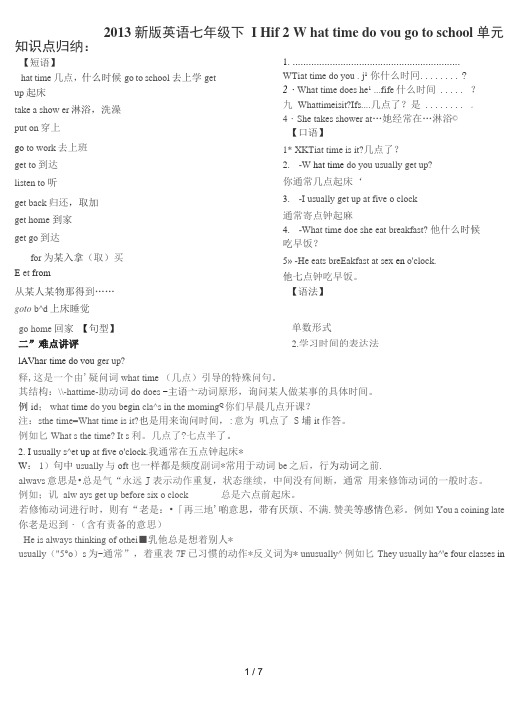
2013 新版英语七年级下 I Hif 2 W hat time do vou go to school 单元知识点归纳:【短语】hat time 几点,什么时候go to school 去上学 get up 起床take a show er 淋浴,洗澡 put on 穿上 go to work 去上班 get to 到达 listen to 听get back 归还,取加 get home 到家 get go 到达for 为某入拿(取)买 E et from从某人某物那得到……goto b^d 上床睡觉 1. ............................................................... WTiat time do you . j 1 你什么时冋 ........ ? 2・ What time does he 1 ...fife 什么时间 ..... ?九 Whattimeisit?Ifs....几点了?是 ........ 。
4・She takes shower at …她经常在…淋浴© 【口语】1* XKTiat time is it?几点了? 2. -W hat time do you usually get up?你通常几点起床‘3. -I usually get up at five o clock通常寄点钟起麻4. -What time doe she eat breakfast? 他什么时候吃早饭?5» -He eats breEakfast at sex en o'clock.他七点钟吃早饭。
【语法】go home 回家 【句型】二”难点讲评lAVhar time do vou ger up?释,这是一个由'疑问词what time (几点)引导的特殊问句。
其结构:\\-hattime-助动词do does -主语亠动词原形,询问某人做某事的具体时间。
Unit2Whattimedoyougotoschool复习资料人教版七年级英语下册
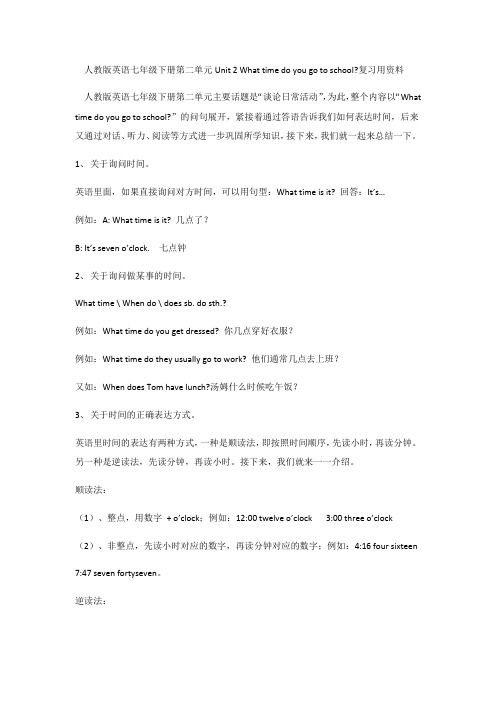
人教版英语七年级下册第二单元Unit 2 What time do you go to school?复习用资料人教版英语七年级下册第二单元主要话题是“谈论日常活动”,为此,整个内容以“What time do you go to school?”的问句展开,紧接着通过答语告诉我们如何表达时间,后来又通过对话、听力、阅读等方式进一步巩固所学知识,接下来,我们就一起来总结一下。
1、关于询问时间。
英语里面,如果直接询问对方时间,可以用句型:What time is it? 回答:It’s…例如:A: What time is it? 几点了?B: It’s seven o’clock. 七点钟2、关于询问做某事的时间。
What time \ When do \ does sb. do sth.?例如:What time do you get dressed? 你几点穿好衣服?例如:What time do they usually go to work? 他们通常几点去上班?又如:When does Tom have lunch?汤姆什么时候吃午饭?3、关于时间的正确表达方式。
英语里时间的表达有两种方式,一种是顺读法,即按照时间顺序,先读小时,再读分钟。
另一种是逆读法,先读分钟,再读小时。
接下来,我们就来一一介绍。
顺读法:(1)、整点,用数字+ o’clock;例如:12:00 twelve o’clock 3:00 three o’clock (2)、非整点,先读小时对应的数字,再读分钟对应的数字;例如:4:16 four sixteen 7:47 seven fortyseven。
逆读法:(1)、当分钟数小于30时,用“分钟对应的数字+ past + 小时对应的数字”,例如:8:12 twelve past eight 9:28 twentyeight past nine 10:08 eight past ten特殊情况:当分钟数等于15时,15可以用英语单词“a quarter来表示”,例如:6:15 a quarter past six;又如:9:30half past nine。
2013版七下_Unit2_What_time_do_you_go_to_school_Section_A

Make dialogues.
What time does Wang Hai usually …?
He usually goes to bed at 9:00. At 7:10 he goes to school. At He At 7:00 8:00 usually 12:00 he he has begins gets has his up lunch. breakfast. his at 6:30. classes. He goes home for supper at about 5:30.
Role-play the conversation.
Interviewer: Scott has an interesting job. He works at a radio station. Scott, what time is your radio show? Scott: From twelve o’clock at night to six o’clock in the morning. Interviewer: What time do you usually get up? Scott: At eight thirty at night. Then I eat breakfast at nine. Interviewer: That’s funny time for breakfast! Scott: Yeah. After that, I usually exercise at about ten twenty. Interviewer: When do you go to work? Scott: At eleven o’clock, so I’m never late for work.
新人教 英语 七年级下册Unit2 What time do you go to school知识点详解

Unit 2 What time do you go to school?知识点详解单元目标总览:【知识点详解】1、What time do you usually get up,Rick?what time 意为“几点;什么时间”,其引导的特殊疑问句用来询问具体的时间点◆---What time do you get up in the morning?你早上几点起床?---At about 7 o’clock.大约在7点。
拓展:what time与whenwhat time翻译为“几点”问的是具体的时间,一般回答要具体到小时。
What time do you go to school? 你什么时候/几点上学?I go to school at half past seven o’clock. 我七点半去上学。
回答具体到点钟,且注意在几点前边的介词用at。
when也是对时间的提问,但与what time的区别是:用when提问,回答既可以是具体的时间,也可以是不具体的时间,如:in the morning,last year,in 1998等范围大的时间,例如:When does he take a shower?他什么时候洗澡?He takes a shower in the morning. 他在早上洗澡。
也可用具体时间:I take a shower at 6 o’clock in the morning. 我早上六点洗澡。
2、get dressed穿上衣服dress做动词,意为“穿衣服”,其宾语多是人,常用短语:dress sb 给某人穿衣服◆The boy can dress himself.这个男孩可以自己穿衣服。
get dressed穿上衣服,表示动作◆Get up and get dressed.起床穿衣服。
be dressed in 穿着,强调状态◆She is dressed in red clothes.她穿着红色的衣服。
- 1、下载文档前请自行甄别文档内容的完整性,平台不提供额外的编辑、内容补充、找答案等附加服务。
- 2、"仅部分预览"的文档,不可在线预览部分如存在完整性等问题,可反馈申请退款(可完整预览的文档不适用该条件!)。
- 3、如文档侵犯您的权益,请联系客服反馈,我们会尽快为您处理(人工客服工作时间:9:00-18:30)。
At eight __________ gets up eats a quick breakfast At eight thirty At noon After school ________________ goes to school ________________ eats hamburgers ________________________________ plays basketball for half an hour __________________ does his homework
Tony’s Activities
in the evening At ten thirty
______________________________ watches TV or plays computer games
brushes teeth and goes to bed
What other healthy activities you know.
eat lots of fruit
exercise
brush teeth twice every day eat a good breakfast
2b Read the passage. Find the answers to the questions.
Healthy activities gets up early _________________
2a Talk about the activities you think are healthy.
go to bed early__ √ eat ice-cream __ eat quickly __
play sports√ __
eat vegetables√ __ take a walk √ __
eats ice-cream in the evening _____________________________ does her homework, swims or ____________ takes walk At nine thirty goes to a bed
Time
Mary’s Activities
____________ At six thirty
gets up
takes a shower and eats a good breakfast ____________ At eight thirtygoes to school At twelve ____________________________ eat lots of fruit and vegetables After lunch ______________ plays volleyball ______________
2c Write down the unhealthy habits of each person. Then think of healthy activities for them.
_________________ __________________ __________________ eats breakfast quickly ____________________ eats hamburgers for lunch __________________ goes to bed late _______________ __________________
⒈起床 get up 2.刷牙 brush one’s teeth 3.洗澡 take/have a shower 4.吃早餐 eat/have breakfast 5.大量、许多 lots of/a lot of in the evening 6.在晚上 be good for 7.对…有好处 much time 8. 大量时间 9.做作业 do one’s homework go to bed 10.上床睡觉 half an hour 11.半小时 eat ice-cream 12.吃冰激凌 13.散步 take a walk either…or… 14.或者…或者
1. Who is healthier, Tony rty. At nine thirty.
2. When does Tony go to bed?
3. When does Mary go to bed?
Read 2b again and fill in the blanks.
Unhealthy habits gets up late Tony _____________
Healthy activities
Unhealthy habits
eats ice-cream Mary _____________ __________________ __________________ eats a good breakfast __________________ __________________ eats lots of vegetables __________________ __________________ goes to bed early __________________ eats ___________________ some fruit after dinner
